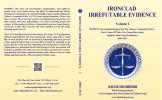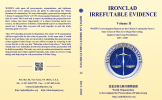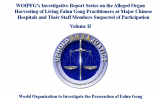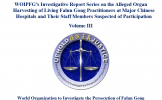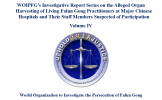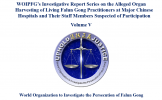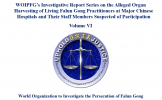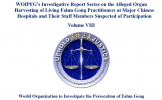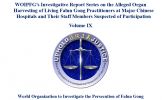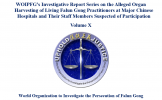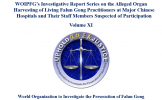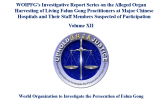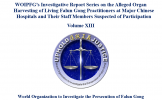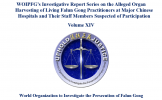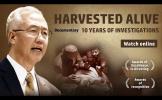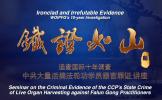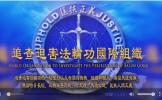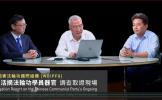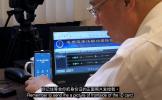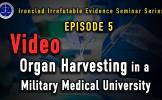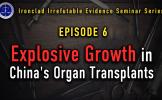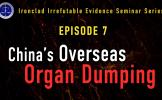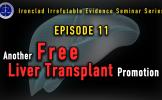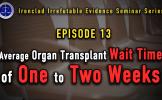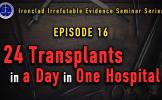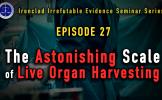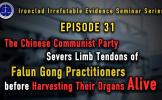WOIPFG’s Investigative Report on the Alleged Organ Harvesting of Living Falun Gong Practitioners at Beijing Chaoyang Hospital, Capital Medical University and Its Staff Members Suspected of Participation
Hospital headquarters’ address: No. 8 Gongti South Road, Chaoyang District, Beijing, China; Post Code: 100020
West branch address: No. 5 Jingyuan Road, Shijingshan District, Beijing; Post Code: 100043
Telephone number: 010-85231000
Hospital profile: Affiliated Beijing Chaoyang Hospital of Capital Medical University is a Class A tertiary hospital.[1] The hospital’s organ transplantation department focuses on kidney transplantation, and it is an important kidney transplant center in the Beijing area. In recent years, its urinary surgery department has been developing rapidly. The hospital’s urinary center has Inpatient Service Section One, Section Two, the West branch hospital inpatient service and an outpatient clinic center, with a total of 112 beds.[2]
I. The hospital’s Hepatobiliary Surgery Department is the site of the Beijing Organ Transplant Center’s Liver Transplant Department
The CCP’s Ministry of Health has an organ transplant center with the capability to simultaneously perform major organ transplants, such as liver, heart, kidney, lung, small intestine and pancreas transplants. The Beijing Organ Transplant Center’s Liver Transplant Department is located in the Hepatobiliary Surgery Department of Beijing Chaoyang Hospital.[3]
II. The hospital has participated in the Beijing Tissue Typing Center to realize kidney transplant networking and kidney sharing. The number of kidney transplants of the hospital ranked first in China for three consecutive years
Five hospitals, including Beijing Friendship Hospital, the PLA No. 301 Hospital, Beijing Chaoyang Hospital, China-Japan Friendship Hospital and Peking Union Medical College Hospital, have participated in the operations of the Beijing Tissue Typing Center. These hospitals belong to four systems, including the Ministry of Health, the Chinese Academy of Medical Sciences, the People’s Liberation Army (PLA) and the municipality of Beijing.[4] Beijing Chao-Yang Hospital claims that from 1998 to 2000, its number of kidney transplants ranked first in China for three consecutive years.[5]
III. The hospital’s strong surgical teams for liver/kidney transplants show that its actual organ transplant volume is massive
In 2014, World Organization to Investigate the Persecution of Falun Gong (WOIPFG) released a list of the hospital’s organ transplant surgeons.[6] The surgeons performing kidney transplants include six chief physicians, nine associate chief physicians and 17 others, with a total of 32 surgeons. The surgeons performing liver transplants include three chief physicians, seven associate chief physicians, five attending physicians and 12 others, with a total of 27 surgeons. They are capable of forming multiple liver and kidney transplant surgical teams.
Zhang Xiaodong was the deputy director of Beijing Chaoyang Hospital’s urinary surgery department and its chief physician. As of 2016, his surgical team had performed more than 3,000 cases of kidney transplantation.[7]
Wang Wei was an associate chief physician of Beijing Chaoyang Hospital’s urinary surgery department. He obtained his doctorate in July 2004. As of 2014, he had independently carried out around 500 cases of renal transplantation and had participated in nearly 1,000 cases of kidney transplant surgeries and postoperative patient management.[8]
Guan Delin was Vice President of the First Hospital of Tsinghua University and Deputy Director of the Beijing Organ Transplant Center. As of 2014, Guan Delin had successfully performed more than 1,000 cases of kidney transplants by himself.[9]
Beijing Business Today reported on September 7, 2005 that Guan Delin had performed “more than 2,700 cases of kidney transplantation, more than 40 cases of living related kidney transplantation, nearly 20 cases of combined pancreas-kidney transplantation.”[10] Guan Delin used to serve as the director of the urology department at the Beijing Red Cross Chaoyang Hospital.[11]

Figure 1. Snapshot of Beijing Business Today Website
By January 1999, he had performed more than 1,000 kidney transplants. In contrast, from January 26, 1999 to September 7, 2005, within six years and seven months, Guan Delin performed more than 1,700 cases of kidney transplantation, while he was serving important leadership positions, performing teaching tasks and working as committee members and editorial board members. Therefore, Guan Delin’s average number of kidney transplants per year was 258 cases (1,700 cases divided by 6.58 years). However, he performed only over 100 cases of kidney transplant surgeries in 1998.[12] So what’s the reason for the large increase in Guan’s workload?[13] Since Guan Delin alone could perform 258 cases of kidney transplantation per year, and there were so many surgeons in this hospital, how large would the annual organ transplant volume be?
IV. The hospital can perform emergency transplants
Usually, emergency liver transplants are emergency liver replacement surgeries performed on patients with acute or severe liver diseases, who can survive for no more than 72 hours. Due to the difficulty of emergency organ matching and the long wait times for donors, emergency liver transplants are not common in foreign countries. In China, emergency liver transplantation has been widely implemented in recent years.
Subject(s) of Investigation: Doctor, the Liver Transplant Doctors’ Office, Beijing Chaoyang Hospital[14]
Date: March 7, 2019 (+86-10-85231504)
Summary: There are a lot of liver transplants performed in this hospital. The wait time is as short as one or two days, maybe half a month sometimes. The wait wouldn’t be too long.
(Recording 1 download: MP3, Transcript download: pdf 012)
V. The organ wait times are very short
Subject(s) of Investigation: He Qiang, Director of Liver, Gallbladder and Spleen Surgery, Beijing Chaoyang Hospital[15]
Date: March 3, 2016 (+86-13701194928)
Summary: “We have always been doing liver transplants. The (organ) wait times are one to two weeks. This year, we have already performed more than a dozen cases, and the price is 700,000 yuan (per case).”
(Recording 2 download: MP3, transcript download: pdf2)
Subject(s) of Investigation: Doctor, Liver Transplant Doctors’ Office, Beijing Chaoyang Hospital[16]
Date: May 3, 2018 (+86-10-85231504)
Summary:
- About 100 cases are done each year.
- It usually can be done in two weeks or so, but the wait time could be up to four weeks.
- Investigator: Are those organs from prisoners or Falun Gong practitioners that were used previously still available?Doctor: None of those are available now, None.
(Recording 3 Download: MP3, Manuscript Download: pdf3)
Subject(s) of investigation: Lang Ren, Director of Liver Transplant, Beijing Chaoyang Hospital [17]
Date: March 1, 2016 (+86-13911757869)
Summary: “If it is critical, we would have a green channel (for organs)”. “If it is a general situation, he needs to wait two weeks the longest in our hospital, because our donor sources are very abundant.”
(Recording 4 download: MP3, transcript download: pdf 4)
VI. Telephone investigation: The hospital admitted to using Falun Gong practitioners as donors
Subject(s) of investigation: Lang Ren, Director of Liver Transplant, Beijing Chaoyang Hospital[18]
Date: November 6, 2018 (+86-13911757869)
Summary:
“If everything goes well, it can be done two or three weeks.”
Investigator: “The donors are those Falun Gong practitioners, that kind of normal healthy donors, right?”
Lang Ren: “Right, right, correct, correct, you are right.”
(Recording 5 download: MP3, Transcript download: pdf 5)
Profile:Lang Ren is a chief physician, an editorial board member of the “Chinese Journal of Hepatobiliary Surgery” and a member of the Beijing Medical Association’s Enteral Nutrition Committee.[19]
Subject(s) of investigation: Dr. Li, Doctor-on-duty, the Urology Surgery, Beijing Chaoyang Hospital
Date: December 2, 2018 (01186-10-85231457)
Summary:
Investigator: “They are still the normal kidney sources from Falun Gong (practitioners), right?”
Dr. Li: “Right, right, right.”
Investigator: “Generally speaking, if you take a donor, you should not only take a kidney, but also the heart, liver and kidney. How long does it take for this process?”
Dr. Li: “About three or four hours.”
Investigator: “It takes three or four hours to get this organ from disinfection, draping to completion, right?”
Dr. Li: “Right, right, right.”
Investigator: “Sometimes you go directly to the source of the kidney to get the organs, and sometimes you transfer them through an intermediary and get them from outside and use them at the hospital. Now you don't need an intermediary, right?”
Dr. Li: “Maybe sometimes now, but generally, yes.”
Investigator: “The organs collected by the intermediary are also normally organs of Falun Gong. The source of the organs is the same, right?”
Doctor Li: “Yes.”
Investigator: “My question is, what the intermediary takes is the same as what you take, right?”
Doctor Li: “Yes, right, right.”
(Recording 6 download: MP3, transcript download: pdf 84)
VII. Telephone investigation shows that the hospital has a large organ transplant volume
Subject(s) of investigation: Doctor, Kidney Transplant, Beijing Chaoyang Hospital[20]
Date: December 27, 2017 (+86-1085231383)
Summary: We have three teams doing kidney transplants; I can’t tell you how many kidney transplants we’ve done this year; quite a lot anyway! More and more, year by year...
(Recording 7 download: MP3, transcript download: pdf7)
Subject(s) of investigation: Doctor Xu, Liver Transplant, Beijing Chaoyang Hospital[21]
Date: June 20, 2019 (+86-10-85231504)
Summary:
Investigator: “You usually do 200 to 300 cases in a year?”
Doctor Xu: “Yes! We do a lot, so don’t worry.”
(Recording 8 download: MP3, transcript download: pdf 057)
Subject(s) of investigation: Doctor-on-duty, the Liver Transplant Office, Beijing Chaoyang Hospital[22]
Date: November 19, 2019 (+86-1085231504)
Summary: “150 cases have been done this year (as of November 2019). The liver transplant department is divided into six medical teams. Since we’re always at full capacity, we cannot admit your patient until after another patient is discharged from the hospital.”
(Recording 9 download: MP3, transcript download: pdf 152)
Subject(s) of investigation: Doctor Liu Yui, Liver Transplant, Beijing Chaoyang Hospital[23]
Date: July 16, 2020 (+86-13911062788)
Summary:
- Investigator: Are you Doctor Liu from the Armed Police General Hospital?
Doctor Liu: I have left the Armed Police General Hospital.
- Come to the hospital as soon as possible, can you come tomorrow morning?
- You come to Beijing Chaoyang Hospital to find me, at the East Bridge in Chaoyang District. Just call me.
- We did not stop during the epidemic, we have continued doing it; we did it yesterday, and did four [transplants] in three days.
- Investigator: If it goes well, can it be done within a month?
Doctor Liu: It should be, I think it can be done.
- The cost is about 800,000 yuan.
(Recording 10 download: MP3, manuscript download: pdf098)
VIII. An illegal organ broker disclosed the dark secrets of Chaoyang Hospital[24]
“There are many kidney sources, and a surgery can be scheduled within a week.” A small kidney transplant advertisement with a phone number appeared in 2017 near many Class A tertiary hospitals in Shanghai, Zhengzhou, Qingdao, Guangzhou, Xiamen and other places. Since November 2017, WOIPFG continuously investigated this case for three months. WOIPFG investigators conducted several investigations on Wang, the contact person in the advertisement, in the name of a patient’s family member, doctor and hospital organ coordinator. During this period, Wang disclosed many dark secrets regarding the organ procurement. The following are some excerpts of the telephone investigations on Wang concerning Beijing Chaoyang Hospital.
Subject(s) of investigation: Mr. Wang, Kidney Transplant Organ Broker (I)
Date: January 3, 2018 (+86 183102589794)
Summary:
- Wang said that in the underground small hospital they built near Beijing Chaoyang Hospital, “They have done several times more cases than the Class A tertiary hospitals this year.”
- The family member of a patient said that they did not feel confident about Wang’s small hospital. Wang said that there was no problem, as all the surgeons were actually the doctors and directors from Class A tertiary hospitals. In his small hospital, “they have done several times more cases this year than the Class A tertiary hospitals.”
- He also said that he performed surgeries “every day”. “I finished another surgery yesterday, you know.” He said that sometime the caller could not find him by phone, because he was busy with surgeries most of the time.
- Wang said that all the surgeries performed in the underground operating room were using living donors. In fact, many of the living donors used by some Class A tertiary hospitals were “all provided by us.” He said that he could arrange for patients to go to Chaoyang Hospital for surgeries, but the kidney sources would be the same, as they would all be living donors provided by them.
- Wang guaranteed that the kidney sources were from young people, “who are all under 25 years old”. “Basically all of them are under the age of 25, and donors of 27 or 28 years old may be accepted if their conditions are particularly good.” Wang said repeatedly that he guaranteed the donors to be young and healthy. When the family member asked why there were so many young males, he said that they had their own channels.
- When being asked whether he could perform organ transplant surgeries other than kidney transplants, Wang replied, “Liver transplants can also be done. For a liver, it probably takes two weeks,” but the surgery could only be performed in a Class A tertiary hospital, with a wait time of just two weeks.
(Recording 11 download: MP3, transcript download: pdf 241)
Subject(s) of investigation: Mr. Wang, Kidney Transplant Organ Broker (II)
Date: January 5, 2018 (+8618310258979)
Summary:
- Wang said that they had “cooperation with Beijing’s Chaoyang (Hospital) and the Armed Police (General Hospital)”. When the investigator asked about both hospitals’ experiences, Wang said, “They have connections, you know? They are afraid of nothing!” When the investigator asked about their connections and how they were developed, Wang replied, “Their directors have connections with the military or the central government, you know? That is, even people know clearly what they’re doing; no one dares to stop them!”
- Wang said that the underground small hospital conducts more transplant surgeries than the Class A tertiary hospitals. “In Chaoyang, we probably have three or four people, in cooperation with the (organ transplant department’s) director. So they give me five cases per person per month. You know, that’s five beds. He, he just tells you that you will be given five beds this month. That means, five cases of surgeries.”
- Wang said, “You should know that we are [operating] illegally. If something goes wrong, you have to settle it by yourself. As long as you do this thing, you don’t want to cause any trouble. If something were to happen, such as an accident, you should handle it by yourself. Don’t, don’t make trouble publicly, don’t make it known to reporters or make trouble abroad. If you make trouble abroad, it’s troublesome.”
- Wang said that they performed kidney excisions at night, only with their own people. “The (practice) in Chaoyang is that the donors are outside (of the hospital). Since only the liver transplants are performed inside the hospital, the donors all have their organs excised in an operating room outside. After being excised, the organs are brought over there.” Wang said that it took about two hours to perform a kidney excision, which is very simple to perform.
- Investigator: “Originally, they arrested a large number of people, because at that time, these petitioners (i.e. Falun Gong practitioners) did not report their names. So they did (live organ harvesting) with these people. But there must be some (other arrests) later on. They have been constantly arresting people. Ah, they would dispose some of them. But after the change of state leadership, this policy still continues. It cannot be discussed openly, right? But, they are still doing it, so he can only turn a blind eye to it, right? Mr. Wang: “Yes, this, this has always been the case.”
- Wang said that there’s an unwritten rule when cooperating with the hospitals. If something happens, “we are like this in this business: we must protect the hospitals. Because if we say it out, then everyone’s crime will become greater and heavier. So we’d rather not say it! Then we would have protected the hospitals. Then you can still operate outside for us; even if you don’t help us operate, we can still cooperate after we are released.” Wang said, “It cannot be said that (the country) does not control it. It also controls it, but that is on the surface, you know.” Wang said, “In 2012 or 2013, around that time, in the international community, a small country at UN, probably instigated by another country, accused our China about this issue. They stirred up some trouble over this issue. They did not mention Falun Gong, but brought up the issue that China used organs from executed prisoners, as a human rights issue. However, our country was able to resolve the issue at that time.”
- The WOIPFG investigator said, “In the past, the organs from the judiciary system were mostly from Falun Gong practitioners. The organs used in transplants now are also from Falun Gong practitioners, but they claim that they are from voluntary donors.” Wang agreed, “Right, right, correct.”
- Wang said, “In Chaoyang, when a patient comes, the director will talk to him seriously, about how his or her operation is going to be like, but there is a problem getting kidney source. Then we will talk with the patient, and we will tell the patient, go tell the director that I have the kidney source, I have a way and I have connections, so I am able to get a kidney for you. Then the director would say, hey, sounds good, go ahead and obtain the kidney yourself, I will arrange the operation for you. Then, even if the operation fails, or some problem occurs, we have secured the patient, you know. If someone from your hospitals comes with the patient, if any problem arises and there is an investigation, he will serve as a witness. It won’t be any problem if the operation goes well, but if anything goes wrong with the operation, he will sure go after you. ”
(Recording 12 download: MP3, transcript download: pdf 242)
Subject(s) of investigation: Mr. Wang, Kidney Transplant Organ Broker (III)
Date: January 9, 2018 (+8618310258979)
Summary:
- Speaking of money, Wang said, “When (surgeries) are performed in other hospitals, we can add a little bit of profit for you (in our pricing), more or less, do you know? We add a little bit of profit for the doctor, who’s mainly in charge of this or the director. It’s roughly, basically around 50,000 yuan…I will add another 50,000 yuan for you, and then you allocate the money among yourselves, okay?” The investigator asked, “Chaoyang and the First Central Hospital, Tianjin First Central Hospital also work like this?” Wang answered, “Yes, yes.”
- Regarding the specific operation, physical examinations are done at the Beijing Armed Forces General Hospital, and operations are done at Chaoyang Hospital. The two procedures appear to be separately carried out. Wang said, “Chao-Yang would take a look at the results of your physical examination. After the hospital looks at them, the patient would come to have a checkup again at Chao-Yang, but the donor will not go through a checkup there, you know. For donors, they (Chao-Yang) only look at the results from previous checkups.”
- Wang said that the procedures are very crucial. “Chaoyang would have a quota. Within the spot in the quota, when he performs a surgery for one patient, for instance, Wang So-and-so, he would do it according to the normal procedures. That is, brain death, or (organ) donations of this kind. After performing a surgery for this patient, he does it again…. when we do it again, it would be imposture. Using Wang So-and-so’s spot within the quota to perform surgeries for other people.”
- The real name of one single person can be used to perform surgeries for more than a dozen individuals.
- The directors at Chaoyang Hospital prepares stamps and performs the forgery in paperwork. Wang reminds the doctors that their hospitals cannot report the actual large number of operations to the Ministry of Health.
- Wang said that in Chaoyang there were two directors falsifying paperwork, Zhang Xiaodong and another director. After hearing the investigator mention the names of Wang Wei and others, he said that they were all doing it. There were two groups, and Hu Xiaopeng and the others were all under Zhang Xiaodong.
- There are at least four people like Wang providing organs to Chaoyang Hospital. And each month each of them can do more than 20 organ transplants outside the hospital. Wang said, “There are four, four people that I know. These are just the ones that I know.” The investigator said, “You see that with four people, that’s more than 80 cases. There would be over 100 cases per month.” Wang said, “They didn’t report that many cases to the higher authorities. There are many, according to me, which were not reported at all, you know. There are way too many people! It’s a little, a little, a little bit against common sense.”
(Recording 13 download: MP3, transcript download: pdf 244)
IX. List of Key Individuals Responsible for Live Organ Harvesting at Beijing Chao-Yamg Hospital
BJCY001. Name: Guan Delin
Serial number: BJCY001
Gender: male
Date of birth: June 16, 1941
Family origin: Anhui Province
He is a member of the Chinese Communist Party.[25]
Profile: Guan is the deputy director of the Institute of Urology, Capital Medical University; Director of Department of Urology, Beijing Chaoyang Hospital; member of The Transplantation Society (TTS); member of the Chinese Dialysis and Transplantation Society (CDTS); member of the Chinese Artificial Organ Academic Committee, member of the Organ Transplantation Key Laboratory Academic Committee of the Ministry of Health; member of the Beijing Branch of the Chinese Society of Medical Information; editorial board member of the Chinese Journal of Organ Transplantation; editorial board member of the Chinese Journal of Nephrology, Dialysis and Transplantation (CNDT) and editorial board member of the Chinese Journal of Dialysis and Artificial Organs.
He graduated with honors from the Department of Medicine, Capital Medical University in 1965, and was assigned to work in the Department of Urology, Beijing Friendship Hospital. He has been teaching at the Capital Medical University for 33 years. And he is currently a master’s student advisor at the Capital Medical University and was hired as a doctorate advisor at the Fourth Military Medical University in 1997.
In 1984, he went to a hospital affiliated with the Harvard Medical School to study hemodialysis and kidney transplantation. After returning to China, he established a modern large-scale hemodialysis center with Professor Yu Huiyuan. In 1994, he went to the Singapore General Hospital for advanced training for one year.[26]
In 1980, the study of infant kidney transplantation to adults was successful, which expanded the potential source of kidney donors. On January 26, 1999, Guan had successfully performed more than 1,000 kidney transplant operations. In 1998 alone, he performed more than 100 cases. In 1998, the Department of Urology at Chaoyang Hospital performed a total of 269 kidney transplants, of which 170 were performed by Guan Delin.[27] According to his profile on September 7, 2005, Guan Delin was vice-president of the First Affiliated Hospital of Tsinghua University and deputy director of the Beijing Organ Transplant Center, and had performed “more than 2,700 kidney transplants and more than 40 kidney transplants with organs donated from the recipients’ relatives, and nearly 20 cases of combined pancreas-kidney transplantation.”[28]
BJCY002. Name: Hu Xiaopeng
Serial number: BJCY002
Gender: male
Profile: Hu is chief physician and associate professor of urology.
He graduated from the Department of Clinical Medicine at Beijing Medical University in 1994 with a bachelor’s degree in medicine; in 2001, he graduated from Peking University with a master’s degree in medicine; in 2009, he graduated from the Capital Medical University with a doctorate in medicine.
From 2009 to 2011, he conducted post-doctoral research in the organ transplantation surgery department of the world-renowned Johns Hopkins University School of Medicine in the U.S., mainly engaging in the basic research related to bone marrow stem cells and transplant immune tolerance. He has conducted short-term academic exchanges at several universities and medical centers, such as the Massachusetts General Hospital, University of Pittsburgh Organ Transplant Center, University of Wisconsin School of Medicine and Public Health and Tokyo Women’s Medical University, and has received training in organ transplantation.
He has been engaging in clinical, scientific research and teaching related to urology and kidney transplantation work for nearly 20 years. He has performed more than 600 cases of human kidney transplant surgeries and has clinical experience in postoperative management.[29] He mainly engages in kidney transplantation work.
BJCY003. Name: Wang Wei
Serial number: BJCY003
Gender: male
Profile: Wang Wei is associate chief physician, associate professor and master’s student supervisor.
As an outstanding graduate of the Capital Medical University in 1996, he was assigned to work at Beijing Chaoyang Hospital. In 1999, he studied for a master’s degree in urology, Capital Medical University; and in 2001, he became to a doctoral student. He obtained a doctorate in medicine in July 2004.
He has independently completed about 500 kidney transplants and participated in the management of nearly 1,000 cases of kidney transplantation and postoperative patient management.[30]
BJCY004. Name: Han Xiuwu
Serial number: BJCY004
Gender: male
Date of birth: 1964
Place of birth: Lixin County, Anhui[31]
Profile: Han is the director and a chief physician of the Department of Urology, West Branch of Beijing Chaoyang Hospital.
He graduated from the Department of Medicine at Anhui Medical University in 1988. After graduation, he worked in the Department of Urology at Beijing Chaoyang Hospital for 15 years and received strict systematic clinical training.
In 2002, he went to Beijing Haidian Hospital to establish its Department of Urology and served as the head of the department. In 2005, he served as deputy director of the Department of Urology, Beijing Shijitan Hospital, Capital Medical University, and director of its Kidney Transplant Center. From 2008 to 2009, he studied minimally invasive urology technologies at Peking University Third Hospital. From March to September 2010, at Beijing Friendship Hospital, he studied minimally invasive urology technologies. Han obtained a doctorate in medicine from the Capital Medical University in 2012. In 2002, he studied organ transplantation at the University of Minnesota and the Organ Transplantation Center of the University of Pittsburgh.
Han has presided over the completion of more than 600 kidney transplants, including living donor kidney transplantation, pediatric kidney transplantation, and complex and highly sensitized patient kidney transplantation.[32]
BJCY005: Wang Yong
Serial number: BJCY005
Gender: male
Profile: Wang is a chief physician of the Urinary Surgery Department and vice president of Yanda Hospital in Beijing.
He has visited the United States, Canada, Britain, France, Germany, Hong Kong, Taiwan and other places many times for studies and academic exchanges. He started working in the kidney transplantation field in 1998.[33] He has performed more than 3,000 kidney transplants.[34]
BJCY006: Li Xiaobei
Serial number: BJCY006
Gender: male
Date of birth: 1972
He is a member of the Chinese Communist Party.[35]
Profile: Li is an associate chief physician of the Urinary Surgery Department at the hospital and a youth member of the Beijing Society of Organ Transplantation, Chinese Medical Association.
He graduated from the Capital Medical University in 1995 with a bachelor’s degree. He obtained his master's and doctoral degrees under the guidance of Professor Guan Delin and Professor Zhang Xiaodong respectively, both renowned experts in urinary surgery and organ transplantation.
In 2002, he went to the University of Minnesota and the University of Pittsburgh’s Medical Center to study kidney transplantation and pancreas transplantation. From 2006 to 2007, he was funded by the Takeda Scholarship of the Chinese Medical Association to study in the Nephrology Institute of Tokyo Women’s Medical University, the largest kidney transplant center in Japan. He has more than a decade of clinical work in kidney transplantation.[36]
BJCY007: Zhang Xiaodong
Serial number: BJCY007
Gender: male
Profile: Zhang is the deputy director and chief physician of the Department of Urinary Surgery at the hospital, deputy secretary-general of the Management Committee of the Chinese Renal Transplant Scientific Registration System, member of the Organ Transplant Branch of the Chinese Medical Association, and member of the Standing Committee of the Organ Transplant Branch of the Beijing Medical Association.
He once worked as a professor in the Department of Urinary Surgery, Peking University People’s Hospital. At the end of 2004, he started to serve as the deputy director of the Institute of Urinary Surgery, Capital Medical University, and the director of the Urology and Nephropathy Clinic and the director of the Department of Urinary Surgery in Beijing Chaoyang Hospital.
As a top expert in urinary surgery and organ transplantation, he leads a highly academic medical team. In recent years, they have completed more than 1,000 kidney transplants, with a cumulative total of more than 3,000 cases, including 240 living related kidney transplants. In particular, they have recently carried out preoperative desensitization treatment for a considerable proportion of sensitized patients (with pre-existing antibodies > 20%) waiting for renal transplantation in China and have completed the clinical studies of 50 cases of sensitized patients’ kidney transplantation holistic treatment.[37]
BJCY008: Liu Hang
Serial number: BJCY008
Gender: female
Profile: Liu is an associate chief physician of urinary surgery at Beijing Chaoyang Hospital.
She graduated from the Department of Clinical Medicine at Shanxi Medical University in 1992 with a bachelor’s degree, and worked in the Department of Nephrology in the Second Affiliated Hospital of Shanxi Medical University. In 2000, she obtained her master’s degree in Pediatric Nephrology from Union Medical University. From 2000 to 2004, she worked in the Nephrology Department of the Chinese People’s Liberation Army General Hospital. In December 2004, she was decommissioned from the army and was transferred to the Department of Urology, Beijing Chaoyang Hospital.[38]
BJCY009: Ren Liang
Serial number: BJCY009
Gender: male
Date of birth: December 1969
Profile: Ren is an associate chief physician.
He graduated from the Department of Clinical Medicine at Shanxi Medical College, and engaged in clinical and scientific research on urological tumors in the Department of Urinary Surgery, Shanxi Provincial Cancer Hospital. From 1999 to 2002, he studied for a master’s degree in the Department of Urinary Surgery, Peking University First Hospital and Peking University Institute of Urinary Surgery. From 2002 to 2005, he was a doctoral student in the Department of Urinary Surgery, Peking University People’s Hospital. From 2005 to 2007, he conducted postdoctoral research in the Department of Urinary Surgery, Capital Medical University, and Beijing Chaoyang Hospital affiliated with Capital Medical University. After finishing his post-doctorate research in December 2007, he was assigned to the Department of Urinary Surgery, Beijing Chaoyang Hospital, to engage in basic research and clinical work on urological diseases, including kidney transplantation.[39]
BJCY010: Yin Hang
Serial number: BJCY010
Gender: male
Profile: Yin is an associate chief physician at the Department of Urinary Surgery.
In 1996, he graduated from the Department of Clinical Foreign Language Medicine of Bethune Medical University with a bachelor’s degree in medicine. Later, he obtained a master’s degree in clinical medicine and a doctorate degree in medicine from Peking University School of Medicine and Capital Medical University, respectively.
From 2011 to 2012, he was engaged in postdoctoral research at the Organ Transplant Center of the University of Wisconsin School of Medicine and Public Health, which has performed the largest number of kidney transplants and combined pancreas-kidney transplants in the United States. And he received systematic training in kidney transplantation and pancreatic transplant surgery and engaged in transplant kidney pathology research there.[40] He has performed nearly 300 kidney transplants independently.
BJCY011: Jiang Yuguang
Serial number: BJCY011
Gender: male
Profile: Jiang is an associate chief physician at the Department of Urinary Surgery. He specializes in kidney transplantation.[41]
BJCY012: Wu Kerang
Serial number: BJCY012
Gender: male
Date of birth: July 1935
Family origin: Shanghai
He is a member of the Chinese Communist Party.[42]
Profile: Wu is a chief physician at the Department of Urinary Surgery. He specializes in kidney transplantation.[43]
BJCY013: Gao Juzhong
Serial number: BJCY013
Gender: male
Date of birth: November 1942
Profile: Gao is President of Beijing Red Cross Chaoyang Hospital, Capital Medical University, Head of the Institute of Urinary Surgery, chief physician and professor of the Department of Urinary Surgery, and member of the Beijing Society of Organ Transplantation, Chinese Medical Association.
He graduated from Peking Union Medical University in 1968 and conducted urological clinical work in Beijing Friendship Hospital after graduation. From 1985 to 1987, he went to the University of California School of Medicine for advanced training in urinary surgery. He specializes in combined kidney-pancreas transplantation.[44]
BJCY014: Chen Dazhi
Serial number: BJCY014
Gender: male
Profile: Chen is a chief physician of hepatobiliary surgery, the director of hepatobiliary, pancreatic and splenic surgery, and member of the Organ Transplant Professional Committee of the Beijing Branch of the Chinese Medical Association. He graduated from the Department of Medicine at Harbin Medical University in 1982.
He studied at Nippon Medical University in 1987, engaging in basic and clinical research on organ transplantation, and obtained a doctorate of medicine from the university in September 1993. In the same year, he was invited by Professor Starzl, a well-known organ transplantation expert from the Institute of Organ Transplantation, University of Pittsburgh, to go to the United States for his post-doctoral research related to clinical liver transplantation and small intestine transplantation. In 1996, he was transferred to the U.S. National Institutes of Health as a researcher and returned to China in 1997.[45]
BJCY015: Lang Ren
Serial number: BJCY015
Gender: male
Profile: Lang is chief physician and associate professor of hepatobiliary surgery.
From March 2010 to July 2011, he was at the Wake Forest Institute for Regenerative Medicine for his post-doctoral research. The Wake Forest Institute for Regenerative Medicine is one of the four largest research institutes in this field in the world.
Since 1999, he has been engaging in clinical work and basic research of liver transplantation, and he has been engaging in the management of critically ill patients after liver transplantation in the surgical intensive care unit (SICU) for two years, as well as the postoperative management of liver transplantation and surgical critically ill patients.[46]
BJCY016: He Qiang
Serial number: BJCY016
Gender: male
Profile: He is the deputy director of hepatobiliary surgery, chief physician of hepatobiliary, pancreatic and splenic surgery, and member of the Organ Transplant Professional Committee of the Beijing Branch of the Chinese Medical Association.
He graduated from West China Medical Center of Sichuan University (formerly West China Medical University) in 1989. He went to Kyoto University, Japan (2003), Queen Mary Hospital, which is affiliated with the University of Hong Kong (2006), and University of Duisburg-Essen, Germany (2007) to study living donor liver transplantation.
After participating in allogeneic liver transplantation in 1999, he has successively carried out piggyback liver transplantation, modified piggyback liver transplantation, combined organ resection liver transplantation, reduced size pediatric liver transplantation, re-liver transplantation and combined liver and kidney transplantation. He is skilled at organ function maintenance during the perioperative period of liver transplantation. He has completed more than 500 liver transplants (including cases outside the hospital).[47]
BJCY017: Wu Tianming
Serial number: BJCY017
Gender: male
Profile: Wu is an associate chief physician of hepatobiliary, pancreatic and splenic surgery.
He has been engaging in the clinical and basic research of liver transplantation for many years, and he has mastered the liver transplantation treatment methods for various end-stage liver diseases.[48]
BJCY018: Fan Hua
Serial number: BJCY018
Gender: male
Profile: Fan is an associate chief physician of hepatobiliary, pancreatic and splenic surgery, and member of European Society for Organ Transplantation (ESOT).
He graduated from the Department of Clinical Medicine, Capital Medical University in 1997 with a bachelor’s degree, and he obtained a master's degree in clinical medicine from the Capital Medical University in 2007. From 2008 to 2011, he completed a doctorate degree at the University of Duisburg-Essen School of Medicine.
He is specialized in organ support and maintenance treatment during the perioperative period of liver transplantation, medium and long-term survival follow-up and management of liver transplantation patients, liver transplantation treatment and comprehensive treatment.[49]
BJCY019: Jin Zhongkui
Serial number: BJCY019
Gender: male
Profile: Jin is an associate chief physician of hepatobiliary, pancreatic and splenic surgery.
He graduated from Zhengzhou University (formerly Henan Medical University) in 1992 with a bachelor’s degree; in 2000, he received a master’s degree from Zhengzhou University; in 2003, he graduated from Huazhong University of Science and Technology Tongji Medical College with a doctorate. From May 2012 to May 2013, he was a visiting scholar at the University of Pittsburgh Medical Center.[50]
BJCY020: Li Xianliang
Serial number: BJCY020
Gender: male
Profile: Li is an associate chief physician of hepatobiliary surgery.
He graduated from China Medical University in 1994 and obtained a master’s degree from the same university in 1997. In 2000, he was funded by the Mrs. Gordon Wu Scholarship as a visiting scholar in Queen Mary Hospital of the University of Hong Kong. In 2004, he studied under Professor Fan Shangda, an academician of the Chinese Academy of Engineering, and obtained a doctorate degree from the University of Hong Kong. He worked as a postdoctoral fellow in France in 2005. Li Xianliang was awarded the TTS Research Fellowship at the World Transplant Congress in Boston, U.S.A. in 2006, and the ESOT Senior Research Grant at the European Society for Organ Transplantation (ESOT) Annual Meeting in Paris, France in 2008.
Since 2007, he has been leading his team to conduct research on transplantation immune tolerance.
In 2010, he was hired by the Department of Hepatobiliary Surgery of Beijing Chaoyang Hospital as an overseas-educated professional. His main work is the management of immune regulation of organ transplantation and liver transplantation.[51]
BJCY021: Kou Jiantao
Serial number: BJCY021
Gender: male
Profile: Kou is a chief physician of hepatobiliary, pancreatic and splenic surgery. He graduated from the School of Oncology, Peking University. He has been doing clinical work on liver transplantation for more than a decade.[52]
BJCY022: Zhu Jiqiao
Serial number: BJCY022
Gender: male
Profile: Zhu is a chief physician of hepatobiliary, pancreatic and splenic surgery. He mainly performs liver transplantation.[53]
BJCY023: Zhao Xin
Serial number: BJCY023
Gender: male
Profile: Zhao is a chief physician and lecturer of hepatobiliary surgery. He mainly performs liver transplantation.[54]
BJCY024: Han Dongdong
Serial number: BJCY024
Gender: male
Profile: Han is an associate chief physician of hepatobiliary surgery and incumbent youth committee member of the Beijing Organ Transplant Branch of the Chinese Medical Association.
He graduated with a master’s degree in hepatobiliary surgery from Southeast University School of Medicine in 2000. He received a doctorate degree in clinical medicine from Capital Medical University in 2005. From March to July 2009, he studied and worked in the Hepatobiliary Surgery Department of the PLA General Hospital.
From May to August 2013, as a visiting scholar, he visited and studied at University of Nebraska Medical Center (UNMC), one of the most famous organ transplant centers in the United States.
He has participated in the clinical work of more than 300 cases of liver transplantation.[55]
BJCY025: Zhang Zhihua
Serial number: BJCY025
Gender: male
Profile: Zhang is a chief physician of hepatobiliary, pancreatic and splenic surgery.
From September 1997 to June 2000, he worked as a resident in the Department of Hepatobiliary Surgery, Zhongda Hospital, School of Medicine, Southeast University. From August 2000 to September 2002, he worked as a resident and general resident in the General Surgery Department of Beijing Chaoyang Hospital, Capital Medical University. He worked as a chief physician from October 2002 to October 2012 in the Departments of General Surgery and Hepatobiliary Surgery at Chaoyang Hospital. From November 2012 to present, he has been working as a deputy chief physician in the Department of Hepatobiliary Surgery at Chaoyang Hospital. He mainly performs liver transplantation.[56]
BJCY026: Li Ping
Serial number: BJCY026
Gender: male
Profile: Li is a chief physician of hepatobiliary, pancreatic and splenic surgery. He mainly performs liver transplantation.[57]
BJCY027: Hou Shengcai
Serial number: BJCY027
Gender: male
Profile: Hou is a chief physician and professor of thoracic surgery, as well as member of the Organ Transplantation Committee of the Beijing Branch of the Chinese Medical Association.
He engages in clinical and basic research of lung transplantation.[58]
BJCY028: Miao Jinbai
Serial number: BJCY028
Gender: male
Profile: Miao is an associate chief physician of thoracic surgery.
He graduated from the Department of Clinical Medicine at China Medical University in 1995, and later obtained his master’s and doctoral degrees from Peking University First Hospital and Capital Medical University respectively.
He studied at the Washington University Medical Center in St. Louis for one year, systematically learning lung transplantation and surgical treatment of chest diseases. He mainly engages in lung transplantation.[59]
BJCY029: Li Hui
Serial number: BJCY029
Gender: male
Profile: Li is director and chief physician of thoracic surgery.
In July 1989, he went to study in the Department of Surgery, Trinity College, University of Dublin, Ireland.[60] A year later, he was hired as a visiting researcher to study esophageal diseases. In June 1992, he completed his dissertation, defended his thesis and obtained his doctorate of medicine. He returned to China in July of the same year and was specially recruited into the army in 1993 to work in the Department of Thoracic and Cardiovascular Surgery at the Naval General Hospital. He has been engaging in thoracic surgery for more than 20 years. From August 2005 to December 2010, he participated in 28 end-stage lung disease lung transplants, including 13 double lung transplants and 15 single lung transplants.[61]
BJCY030: Hu Bin
Serial number: BJCY030
Gender: male
Profile: Hu is a chief physician and deputy director of the department of thoracic surgery.
He graduated from the Medical Department of Shandong Medical University (currently Shandong University School of Medicine) in 1991, and obtained a master’s degree in Thoracic Surgery from Capital Medical University in 2000, and a Ph.D. in Thoracic Surgery from Capital Medical University in 2007. He was assigned to the Department of Thoracic Surgery in Beijing Chaoyang Hospital in 1991, and he has been working there since.
In 2004, he went to Washington University to do advanced studies in lung transplantation and lung volume reduction. He has been engaging in basic and clinical research on lung transplantation and lung volume reduction for many years. At present, he mainly performs lung transplantation.[62]
BJCY031: Wang Yang
Serial number: BJCY031
Gender: male
Profile: Wang is an associate chief physician of thoracic surgery.
He studied at the Xenerate Organ Transplant Center of Uppsala University in Sweden.[63] He organized and participated in 11 lung transplant operations in Beijing Chaoyang Hospital. And he mainly engages in chest tumor and lung transplantation, lung volume reduction clinical surgery and basic research, and he performs lung transplantation.
BJCY032: Li Tong
Serial number: BJCY032
Gender: male
Profile: Li is a chief physician of thoracic surgery.
He graduated from Capital Medical University with a Ph.D. and completed his postdoctoral training at the University of California, San Francisco.[64] From August 2005 to December 2010, he participated in 28 end-stage lung disease lung transplants, including 13 double lung transplants and 15 single lung transplants.[65]
BJCY033: Su Pixiong
Serial number: BJCY033
Gender: male
Date of birth: November 1966
Profile: Su is Director of Department of Cardiac Surgery, and a chief physician and professor.[66]
From September 1984 to September 1989, he was studying at Tongji Medical University, Department of Medicine and obtained his bachelor degree in medicine. Later, he graduated from Capital Medical University with a Ph.D. From October 1999 to May 2000, he received advanced training in cardiac surgery at the Cardiac Center, Mainpal Hospital, Bangalore, India. He started performing heart transplantation in July 2001, and completed two orthotopic allograft operations.[67]
BJCY034: Li Xuedong
Serial number: BJCY034
Gender: male
Profile: Li is an associate chief physician of the Department of Ophthalmology. He mainly engages in various corneal transplant operations.[68]
BJCY035: Zhang Xiaosheng
Serial number: BJCY035
Gender: male
Profile: Zhang is an associate chief physician of the Department of Ophthalmology.
He has been engaging in ophthalmological work for 20 years and has extensive clinical experience. He studied in Australia for six months. He mainly engages in ophthalmic surgeries, such as keratoplasty.[69]
BJCY036: Niu Gailing
Serial number: BJCY036
Gender: female
Profile: Niu is an associate chief physician of the Department of Ophthalmology.
In 2001, she was transferred to the Department of Ophthalmology, Beijing Chaoyang Hospital from Peking University People’s Hospital. She studied corneal diseases and corneal transplantation from the famous ophthalmology professor Academician Xie Lixin, and learned the diagnosis and treatment of fundus diseases from the famous ophthalmologists Professor Li Xiaoxin and Professor Jiang Yanrong.[70]
BJCY037: Li Peng
Serial number: BJCY037
Gender: male
Profile: Li is an associate chief physician of the Department of Hernia and Abdominal Wall Surgery and director of the Medical Affairs Office. He graduated from the Department of Clinical Medicine, Capital Medical University. And he mainly engages in liver transplantation.[71]
Reference:
[1] Beijing Chaoyang Hospital website. “Hospital Overview”. Archived link: https://archive.is/9yecw
[2] Beijing Chaoyang Hospital website. “Urinary Surgery Department Overview”. Archived link: https://archive.is/i9gpY
[3] Introduction of the Hepatobiliary Surgery Department of Beijing Chaoyang Hospital.
Retrieved from https://web.archive.org/web/20080503222008/http://www.bjcyh.com.cn/ksjs…
WOIPFG Archived Link:
http://www.upholdjustice.org/upload/images/nationalcriminalreports/719.pdf
[4] Li Zhexian, Er Xiujiang, Yu Kun, Ma Weiran, Lü Jie, Zhang Yuhai, Jia Baoxiang, Wu Junjie, Bi Rumei, Xue Zhu, Tang Yawang, Xie Zelin. (2001). “Necessary Conditions for the Establishment and Successful Operation of Beijing Organ Transplant Matching Center.” China Journal of Clinical Medicament, 2001, Vol. 2, No. 1.
WOIPFG archived links:
http://www.zhuichaguoji.org/sites/default/files/report/2016/64700_0621071.pdf
http://www.zhuichaguoji.org/sites/default/files/report/2016/64700_0621072.pdf
[5] Family Doctors Online. “Beijing Chaoyang Hospital - Urinary Surgery Department Overview”. Archived link:
[6] The World Organization to Investigate the Persecution of Falun Gong releases the list of medical personnel from medical institutions not affiliated with the military suspected of committing organ harvesting from living Falun Gong practitioners. (2014, Dec. 22). Retrieved from http://www.zhuichaguoji.org/node/45769#_Toc404902983
[7] Beijing Chaoyang Hospital. “Urinary Surgery Department Experts’ Profiles – Zhang Xiaodong”. http://www.bjcyh.com.cn/ksyl/wkxt/mnwk/zj/0/14264.shtml WOIPFG archived link:
http://www.zhuichaguoji.org/sites/default/files/report/2016/64700_06350…
[8] Beijing Chaoyang Hospital. “Urinary Surgery Department Experts’ Profiles – Wang Wei”.
http://www.bjcyh.com.cn/ksyl/wkxt/mnwk/zj/0/14253.shtml
WOIPFG archived link:
http://www.zhuichaguoji.org/sites/default/files/report/2016/64700_063506.png
[9] Website for the Secondary Division of Urologic Surgery, Xinqiao Hospital of the Third Military Medical University. Retrieved from
WOIPFG Archived Link:
http://www.zhuichaguoji.org/sites/default/files/report/2016/64700_0601.png
[10] Beijing Business Today. “Top experts of kidney transplantation in Beijing”. Archived link:
https://web.archive.org/web/20051123054121/http://www.bjbusiness.com.cn…
[11] Guan Delin’s Profile. Archived link: https://web.archive.org/web/20030729152643/http://www.myb518.com/ndz/zh…
[12] Liu, Wanbao and Yang Xiaojuan "For the Smiles of Patients - Professor Guan Delin, an Expert in Kidney Transplantation" People's Daily. (January 26, 1999, Page 5)
The original webpage (web.peopledaily.com.cn/199901/ 26/newfiles/col_990126001062_zhxw.html) and its Google cashed page both disappeared within a few hours after the article received renewed attention.
[13] "The Epoch Times". “The investigation of surgical homicides will hold individuals liable”. Updated on May 20, 2006. http://www.epochtimes.com/gb/6/5/21/n1325184.htm
[14] WOIPFG. “The WOIPFG 2019 Investigations on the Status Quo of CCP's Live Organ Harvesting of Falun Gong Practitioners”. http://www.zhuichaguoji.org/node/125981
[15] WOIPFG. “WOIPFG’s Latest Investigation Results: in the Name of ‘Organ Donation’, CCP Continues to Harvest Organs from a Large Number of Living Falun Gong Practitioners.” July 15, 2016. http://www.upholdjustice.org/node/358
[16] WOIPFG. “The WOIPFG 2019 Investigations on the Status Quo of CCP's Live Organ Harvesting of Falun Gong Practitioners”. http://www.zhuichaguoji.org/node/125981
[17] WOIPFG. “WOIPFG’s Latest Investigation Results: in the Name of ‘Organ Donation’, CCP Continues to Harvest Organs from a Large Number of Living Falun Gong Practitioners.” July 15, 2016. http://www.upholdjustice.org/node/358
[18] WOIPFG. “A WOIPFG Investigation Report on the Chinese Communist Party’s Ongoing Crime of Live Organ Harvesting against Falun Dafa Practitioners (VI)”. http://www.upholdjustice.org/node/404
[19] Beijing Chaoyang Hospital, Capital Medical University, "Medical Network".
http://hpt2000017211.h.yynet.cn/ WOIPFG archived links: http://www.zhuichaguoji.org/media/2019/0712/SC38.pdf
http://www.zhuichaguoji.org/media/2019/0814/158.pdf
[20] WOIPFG. “A WOIPFG Investigation Report on the Chinese Communist Party’s Ongoing Crime of Live Organ Harvesting against Falun Dafa Practitioners (V)”. https://www.zhuichaguoji.org/node/96870
[21] WOIPFG. “The WOIPFG 2019 Investigations on the Status Quo of CCP's Live Organ Harvesting of Falun Gong Practitioners”. http://www.zhuichaguoji.org/node/125981
[22] WOIPFG. “The WOIPFG 2019 Investigations on the Status Quo of CCP's Live Organ Harvesting of Falun Gong Practitioners”. http://www.zhuichaguoji.org/node/125981
[23] WOIPFG. “The WOIPFG 2019 Investigations on the Status Quo of CCP's Live Organ Harvesting of Falun Gong Practitioners”. http://www.zhuichaguoji.org/node/125981
[24] WOIPFG. “WOIPFG’s Comprehensive Investigation Results regarding the Chinese Communist Party’s Live Organ Harvesting of Falun Gong Practitioners.” https://www.upholdjustice.org/node/419
[25] “CNTV”. “Guan Delin, visiting professor at Wu Jieping Urology Center, Peking University”. http://jiankang.cntv.cn/2013/04/27/ARTI1367049747866190.shtml
Archived link: https://archive.is/wip/nA7ky
[26] Profile of Guan Delin. http://www.myb518.com/ndz/zhuanjia/gdljl.htm
[27] “Special topic on Beijing Kidney Transplant Expert Guan Delin, Kidney Transplant Expert of Jingshen Ji”. “People’s Daily” (Page 5 on January 26, 1999). http://www.boxun.com/forum/officer/9529.shtml
Archived link: https://archive.is/qfugM
[28] "Beijing Modern Business Daily". “Top Experts in Kidney Transplant Surgery in Beijing”. https://web.archive.org/web/20051123054121/http://www.bjbusiness.com.cn…
[29] "Beijing Chaoyang Hospital". “Urology Expert Profile - Hu Xiaopeng”. http://www.bjcyh.com.cn/ksyl/wkxt/mnwk/zj/0/14261.shtml
Archived link: https://web.archive.org/web/20140419014855/http://www.bjcyh.com.cn/ksyl…
[30] "Beijing Chaoyang Hospital". “Urology Expert Profile – Wang Wei”. http://www.bjcyh.com.cn/ksyl/wkxt/mnwk/zj/0/14253.shtml
Archived link: https://web.archive.org/web/20140419014842/http://www.bjcyh.com.cn/ksyl…
[31] "The Epoch Times". “Kunming becomes China's largest kidney supplier”.
https://www.epochtimes.com/gb/6/6/22/n1359279.htm
Archived link: https://archive.is/wip/fkL6r
[32] “Good Doctors Online”. “Profile of Dr. Han Xiuwu”. http://www.haodf.com/doctor/DE4rO-XCoLUajctG0lPR5qqdfm.htm
Archived link: https://web.archive.org/web/20140702223015/http://www.haodf.com/doctor/…
[33] "Beijing Chaoyang Hospital". “Urology Expert Profile – Wang Yong”. http://www.bjcyh.com.cn/ksyl/wkxt/mnwk/zj/0/14248.shtml
Archived link: https://web.archive.org/web/20140910102104/http://www.bjcyh.com.cn/ksyl…
[34] "Yanda Hospital". “The Department of Urology of Yanda Hospital successfully performed a transplant nephrectomy.” March 17, 2015. http://www.ydyy120.com/mnw/927/35979.html
Archived link: https://web.archive.org/web/20171227174456/http://www.ydyy120.com/mnw/9…"
[35] "Beijing Chaoyang Hospital". “Leader information – Li Xiaobei”. https://www.bjcyh.com.cn/Html/News/Articles/20321.html
Archived link: https://archive.is/wip/DoWdP
[36] "Beijing Chaoyang Hospital". “Urology Expert Profile – Li Xiaobei”. http://www.bjcyh.com.cn/ksyl/wkxt/mnwk/zj/0/14246.shtml
Archived link: https://web.archive.org/web/20140419014620/http://www.bjcyh.com.cn/ksyl…
[37] "Beijing Chaoyang Hospital". “Urology Expert Profile – Zhang Xiaodong”. http://www.bjcyh.com.cn/ksyl/wkxt/mnwk/zj/0/14264.shtml
https://web.archive.org/web/20140331185606/http://www.bjcyh.com.cn/ksyl…
[38] "Beijing Chaoyang Hospital". “Urology Expert Profile – Liu Hang”. http://www.bjcyh.com.cn/ksyl/wkxt/mnwk/zj/0/14244.shtml
https://web.archive.org/web/20140910152614/http://www.bjcyh.com.cn/ksyl…
[39] "Beijing Chaoyang Hospital". “Urology Expert Profile – Ren Liang”. http://www.bjcyh.com.cn/ksyl/wkxt/mnwk/zj/0/14252.shtml
https://web.archive.org/web/20140419014406/http://www.bjcyh.com.cn/ksyl…
[40] "Beijing Chaoyang Hospital". “Urology Expert Profile – Yin Hang”. http://www.bjcyh.com.cn/ksyl/wkxt/mnwk/zj/20121119/26087.shtml
https://web.archive.org/web/20140419014338/http://www.bjcyh.com.cn/ksyl…
[41] “Good Doctors Online”. “Profile of Jiang Yuguang”. http://www.haodf.com/doctor/DE4r0eJWGqZNKECrc15DZr2dvRhXMk1f.htm
https://web.archive.org/web/20150515133726/http://www.haodf.com/doctor/…
[42] Baidu Baike. “Profile of Wu Kerang”. https://baike.baidu.com/item/%E5%90%B4%E5%85%8B%E8%AE%A9/16535747
[43] "Beijing Chaoyang Hospital". “Urology Expert Profile – Wu Kerang”. http://www.bjcyh.com.cn/ksyl/wkxt/mnwk/zj/0/14260.shtml
https://web.archive.org/web/20140910102921/http://www.bjcyh.com.cn/ksyl…
[44] Baidu Baike. "Beijing Chaoyang Hospital". http://baike.baidu.com/view/724298.htm
[45] "Beijing Chaoyang Hospital". “Urology Expert Profile – Chen Dazhi”. http://www.bjcyh.com.cn/ksyl/wkxt/gdwk/zj/0/19297.shtml
https://web.archive.org/web/20140419013945/http://www.bjcyh.com.cn/ksyl…
[46] "Beijing Chaoyang Hospital". “Urology Expert Profile – Lang Ren”. http://www.bjcyh.com.cn/ksyl/wkxt/gdwk/zj/20120929/25447.shtml
https://web.archive.org/web/20140419013917/http://www.bjcyh.com.cn/ksyl…
[47] "Beijing Chaoyang Hospital". “Urology Expert Profile – He Qiang”. http://www.bjcyh.com.cn/ksyl/wkxt/gdwk/zj/0/19296.shtml
https://web.archive.org/web/20140419013856/http://www.bjcyh.com.cn/ksyl…
[48] “Beijing Chaoyang Hospital". “Urology Expert Profile – Wu Tianming”. http://www.bjcyh.com.cn/ksyl/wkxt/gdwk/zj/0/19293.shtml
https://web.archive.org/web/20140419013849/http://www.bjcyh.com.cn/ksyl…
[49] “Beijing Chaoyang Hospital". “Urology Expert Profile – Fan Hua”. http://www.bjcyh.com.cn/ksyl/wkxt/gdwk/zj/20120929/25446.shtml
https://web.archive.org/web/20140419013733/http://www.bjcyh.com.cn/ksyl…
[50] “Beijing Chaoyang Hospital". “Urology Expert Profile – Jin Zhongkui”. http://www.bjcyh.com.cn/ksyl/wkxt/gdwk/zj/0/19295.shtml
https://web.archive.org/web/20140910102656/http://www.bjcyh.com.cn/ksyl…
[51] “Beijing Chaoyang Hospital". “Urology Expert Profile – Li Xianliang”. http://www.bjcyh.com.cn/ksyl/wkxt/gdwk/zj/20130731/28732.shtml
https://web.archive.org/web/20140419013622/http://www.bjcyh.com.cn/ksyl…
[52] “Good Doctors Online”. “Profile of Kou Jiantao”. http://www.haodf.com/doctor/DE4r0eJWGqZNKMCIMTMQbtBMDWj5BR7h.htm
https://web.archive.org/web/20140419013530/http://www.haodf.com/doctor/…
[53] “Good Doctors Online”. “Profile of Zhu Jiqiao”. http://www.haodf.com/doctor/DE4r0eJWGqZNKNh0k6eXVaz-3cVK5Twt.htm
https://web.archive.org/web/20150329141915/http://www.haodf.com/doctor/…
[54] “Good Doctors Online”. “Profile of Zhao Xin”. http://www.haodf.com/doctor/DE4r0eJWGqZNKMK0ys4JnoLH6TmC9xRR.htm
https://web.archive.org/web/20140812011951/http://www.haodf.com/doctor/…
[55] “Good Doctors Online”. “Profile of Han Dongdong”. http://www.haodf.com/doctor/DE4r0eJWGqZNKlCpnz8zO99C2br23VVO.htm
https://web.archive.org/web/20150329080632/http://www.haodf.com/doctor/…
[56] “Good Doctors Online”. “Profile of Zhang Zhihua”. http://www.haodf.com/doctor/DE4r0eJWGqZNKNhoLvjfGtBMDWj5BR7h.htm
https://web.archive.org/web/20150329154617/http://www.haodf.com/doctor/…
[57] “Good Doctors Online”. “Profile of Li Ping”. http://www.haodf.com/doctor/DE4r0eJWGqZNKXxqIWK93uS3qrtB-fTr.htm
[58] “Beijing Chaoyang Hospital". “Urology Expert Profile – Hou Shengcai”. http://www.bjcyh.com.cn/ksyl/wkxt/xwk/zj/0/19304.shtml
https://web.archive.org/web/20140331174145/http://www.bjcyh.com.cn/ksyl/wkxt/xwk/zj/0/19304.shtml
[59] “Beijing Chaoyang Hospital". “Urology Expert Profile – Miao Jinbai”. http://www.bjcyh.com.cn/ksyl/wkxt/xwk/zj/0/19298.shtml
https://web.archive.org/web/20140419013325/http://www.bjcyh.com.cn/ksyl…
[60] “Beijing Chaoyang Hospital". “Urology Expert Profile – Li Hui”. http://www.bjcyh.com.cn/ksyl/wkxt/xwk/zj/0/19303.shtml
https://web.archive.org/web/20140419013311/http://www.bjcyh.com.cn/ksyl…
[61] Authors: Miao Jinbai, Hou Shengcai, Li Hui, Hu Bin, Dai Huaping, Li Tong, Wang Yang, Yu Bin, Fu Yili, Chen Qirui and Zhang Wenqian (100020, Beijing Chaoyang Hospital, Capital Medical University, Beijing Institute of Respiratory Diseases, Department of Thoracic Surgery). “28 cases of lung transplantation”. The Chinese Journal of Thoracic and Cardiovascular Surgery. 2012, Volume 28, Issue 03, 138-140, pp. 151
[62] “Beijing Chaoyang Hospital". “Urology Expert Profile – Hu Bin”. http://www.bjcyh.com.cn/ksyl/wkxt/xwk/zj/0/19300.shtml
https://web.archive.org/web/20140419013259/http://www.bjcyh.com.cn/ksyl…
[63] “Beijing Chaoyang Hospital". “Urology Expert Profile – Wang Yang”. http://www.bjcyh.com.cn/ksyl/wkxt/xwk/zj/0/19299.shtml
https://web.archive.org/web/20140419013251/http://www.bjcyh.com.cn/ksyl…
[64] “Beijing Chaoyang Hospital". “Urology Expert Profile – Li Tong”. http://www.bjcyh.com.cn/ksyl/wkxt/xwk/zj/0/19302.shtml
https://web.archive.org/web/20140419012927/http://www.bjcyh.com.cn/ksyl…
[65] Authors: Miao Jinbai, Hou Shengcai, Li Hui, Hu Bin, Dai Huaping, Li Tong, Wang Yang, Yu Bin, Fu Yili, Chen Qirui and Zhang Wenqian (100020, Beijing Chaoyang Hospital, Capital Medical University, Beijing Institute of Respiratory Diseases, Department of Thoracic Surgery). “28 cases of lung transplantation”. The Chinese Journal of Thoracic and Cardiovascular Surgery. 2012, Volume 28, Issue 03, 138-140, pp. 151
[66] "Sina Blog". “Director Su’s Biography.” http://blog.sina.com.cn/s/blog_5eb04bae0100ch2t.html
[67] Good Doctors Online”. “Profile of Dr. Su Pixiong”. http://www.haodf.com/doctor/DE4r08xQdKSLeD0gYNv5LwmK7DLi.htm
https://web.archive.org/web/20140419012727/http://www.haodf.com/doctor/…
[68] “Beijing Chaoyang Hospital". “Ophthalmology Expert Profile – Li Xuedong”. http://www.bjcyh.com.cn/ksyl/wg/yk/zj/0/14368.shtml
https://web.archive.org/web/20140419013441/http://www.bjcyh.com.cn/ksyl…
[69] “Beijing Chaoyang Hospital". “Ophthalmology Expert Profile – Zhang Xiaosheng”. ttp://www.bjcyh.com.cn/ksyl/wg/yk/zj/0/14370.shtml
https://web.archive.org/web/20140419013353/http://www.bjcyh.com.cn/ksyl…
[70] “Beijing Chaoyang Hospital". “Ophthalmology Expert Profile – Niu Gailing”. http://www.bjcyh.com.cn/ksyl/wg/xqyk/zj/0/19787.shtml
https://web.archive.org/web/20140419013346/http://www.bjcyh.com.cn/ksyl…
[71] "Seeking Medical Experts Network". “Profile of Li Peng, Department of Hernia and Abdominal Wall Surgery, Jingxi District, Chaoyang Hospital.” http://z.xywy.com/zhuanjia-bjcyh1-hefubiwaike-pwklipeng.htm


